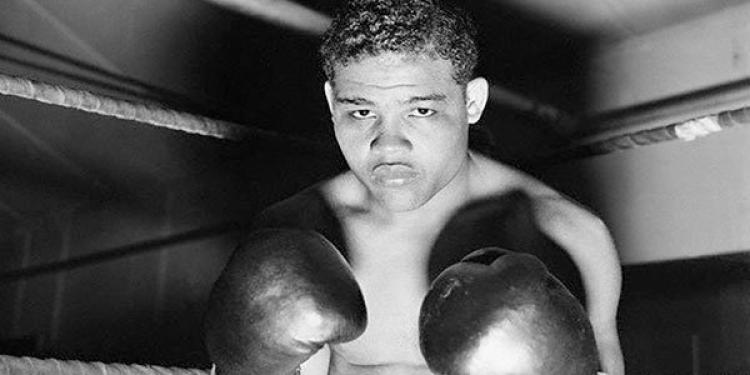The Mighty Joe Louis
Posted: April 1, 2015
Updated: October 6, 2017

The Brown Bomber held up the sport of boxing while it was in a decline.
Joseph Louis Barrow, born in 1914 in Lafayette, Alabama, is considered one of the greatest heavyweight champs of all time. His advent into the sport came at just the right time during the decline which followed Jack Dempsey’s era. Along with Dempsey’s unseen commercial success and popularity of boxing in America came a disparaging resentment that came along with negative accusations of gambling and ill repute.
• Joe Louis grew up in rural Alabama until 14
• Joe Louis became the first African American National hero
• Joe Louis defended his title a record 25 times
Joe Louis took upon himself a persona that was grounded in honestly, hard work and integrity which he was able to uphold inside and outside of the ring during his 140 months as World Heavyweight Boxing Champion. His 25 title defenses are a record for any division. Louis’ cultural status as a hero fighting against Nazism was very popular in U.S. gambling news and all news alike.
Joe Louis’ Early Years
Joe Louis was born and raised as child in rural Alabama. The seventh of eight children, Joe’s parents were former slaves. They worked in sharecropping and rental farming where they would pay someone for parcels of land to farm on. Joe had a speech impediment which probably caused him difficulty in acquiring a formal education. His father Monroe, was committed to a mental institution so Joe saw little of him.
In his early teens, Joe lived with his mother and her new husband Pat Brooks, a construction contractor. After an incident of harassment by the Ku Klux Klan, Joe’s family relocated to Detroit, Michigan. Joe spent times at a local youth center to escape the growing gang activity in his area. Knowing his mother didn’t approve of him boxing, Joe hid his passion from her.

Fighting his first bout at 17, Joe lost to a future Olympian named Johnny Miller. Apart from that, Joe was able to secure many victories as an amateur including the club championship at his recreation center. A year later, Joe won the Detroit-area Golden Gloves Novice Division Championship. A year later he won Golden Gloves for the open division and the Chicago Tournament of Champions.
Joe’s entrance into the professional years
Ending his amateur career by winning the U.S Amateur Champion National AAU tournament in 1934, Joes amassed an amateur record of 50 wins and 4 losses. Joe gained a reputation as a serious contender and eventually hired Roxborough, a bookmaker (equivalent to a sports book for mobile sports betting), to be his manager. Roxborough used racism against white managers to steer Joe’s trust during a time when the segregated south was in its height.
Roxborough soon found a boxing promoter, named Julian Black, with a stable of boxers Louis could practice with as well as trainer named “Chappy” Blackburn. Joe ended up winning all 12 fights he had that year. Even though Joe kept winning, his management found it increasingly difficult to arrange fights with serious contenders because many white Americans feared another black heavyweight champion gaining popularity.
The management of Joe Louis knew that in order to break the glass ceiling that represented the “color barrier” in boxing, Joe would have to sign up with a white promoter. Joe’s management signed a 3-year deal with Mike Jacobs. In order for Joe to change societies cultural attitudes about black fighter, Roxborough and Black wrote the seven commandments for Joe’s personal conduct.
The commandments included never having a picture taken with a white woman, never gloating over a fallen opponent, never engaging in fixed fights and living a clean lifestyle in and out of the ring. These “commandments” were instrumental in Joe’s embracement by the white dominated media establishment. Joe ended up being the number one heavyweight contender all the way until his impending defeat by the infamous Max Schmeling. That bout would minimize Joe’s next fight beating Braddock for the title.
The Schmeling Years and Beyond
Max Schmeling, a German, who was World Heavyweight Champ when he knocked him out in 1936. Having carefully studied Joe Louis’ style, Schmeling felt he knew Joe’s weakness. It was only after a back alley deal, which definitely didn’t happen according to US gambling laws, that Braddock would fight for the heavyweight title against Joe. This was partly done out of fear of Nazi authorities who support Schmeling.

After a few title defenses, Joe would finally face Schmeling again. This match would become one of the most famous of sports in the 20th century. His defeat of Joe Louis, made Schmeling a national hero in Germany. The victory over an African American was upheld has proof of “Aryan superiority.” At the same time, Joe was seen by everyone, including President Roosevelt, as their national hero and champion over Nazism.
The two finally met again in 1938, at Yankee Stadium, among a crowd of over 70,000. The fight would last 2 minutes and 4 seconds. Joe sent a barrage of punches resulting in three knockdowns with Schmeling only delivering two punches the entire fight. Joe career didn’t carry any more excitement and was put on hold after the Japanese attacked Pearl Harbor in 1942.
Joe Louis entered the military and sent to basic training in a segregated cavalry unit in Fort Riley, Texas. There he forged a friendship with Jack Robinson, who would become the first African American professional baseball player. Joe involved himself in charities, promotional bouts and recruitment campaigns. Although he never went into combat, Joe eventually reached technical sergeant and was rewarded with the “Legion of Merit.”
Owing large sums of money in taxes and other debt, Joe had to continue boxing. His last major fight before retirement was again Jersey Joe Walcott in 1947. Even though he was able to survive two knockouts and go on to knockout Walcott in the 11th round. A little more than a year later, Joe announced his retirement. Coming out of retirement in 1951, Joe fought and lost to undefeated heavyweight champion Rocky Marciano.











